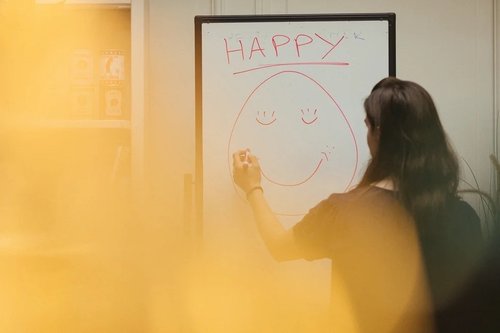Taylorism revisited: Why we’re obsessed with work performance
Jul 11, 2022
3 mins


WORK ETHIC - Everywhere you look these days there are tips on how to up your work performance: be better organized, avoid procrastination, improve your concentration levels, get an ergonomic chair…
But while wanting to do your job well is great, letting it become an obsession is often counterproductive and, above all, risks taking a toll on our mental health. And it begs the question: Should performance and productivity really be the primary indicators of our value as workers?
Celine Marty, an associate professor of philosophy at The University of Franche-Comté, offers a round-up of what the greatest philosophers and thinkers have to say about the topic and advises on how to do away with the artificial culture of work performance.
Where does this demand for performance come from?
Optimizing staff performance seems to be the aim of all organizations. They try to eliminate dead time or divide tasks between staff members to make each one more efficient. This follows the example of Taylorism, a factory management system developed in the late 19th century to increase efficiency and break down production into specialized repetitive tasks. With each person concentrating on a single aspect, the aim is to improve specialized skills while boosting productivity across the whole workforce. But, it also pressures workers to do more and more in less time.
The French philosopher Simone Weil wrote about her experience of working in a factory in her 1951 book La Condition Ouvrière (The Worker’s Plight). To be successful, workers must stop thinking about what they’re doing and start behaving like machines. Worn down by the relentless pace, work begins to feel meaningless.
You might think we’ve come a long way since Taylorism was introduced. And yet today, many of us feel the very same pressure to hit unattainable targets: find X clients a month, manufacture or sell X products, produce X reports or articles a year, handle even more students and patients, or perform a certain number of medical procedures.
In his book Bullshit Jobs, anthropologist David Graeber says this pressure is due to the power of capitalism. Companies relentlessly exploit real productive workers to maximize profits and the dividends paid to shareholders. They are expected to do more and more with less and less. This creates these bullshit jobs where professionals are tasked with producing PowerPoint presentations and Excel spreadsheets to boost investments. Quantity is the only thing that counts: quality is overlooked, especially as it’s harder to measure.
What are the risks for employees?
This has far-reaching consequences for our experience of work. Axel Honneth, a professor of the humanities in the Department of Philosophy at Columbia University, writes in his book The Struggle for Recognition that the constant demands for improved performance affect our self-respect and self-esteem. We don’t appreciate what we’ve done today because we’re always thinking about what we can do tomorrow. An ever-increasing workload also leads to burnout. What’s more, performing well at work isn’t enough; we also need to perform well on the job market to get new opportunities.
In his 2003 book, The Immaterial, French social philosopher André Gorzwe writes that we see ourselves as a type of commodity to be sold in a highly competitive job market. That’s why we constantly seek to improve ourselves with further training or study. According to a Gallup study in partnership with Amazon, in 2021, 57% of workers are very or extremely interested in participating in training or to learn new skills that could help them advance their careers. This may well point to an admirable desire to learn, but it can also lead to perfectionism and the feeling of being an imposter: if our skills can always be improved, that must be because we are never quite good enough.
How can you do away with the artificial demands for performance at work?
You can avoid numerical targets, measurements, and objectives, which often ignore the quality of the work. These are the bullshit indicators that mean next to nothing. In reality, our colleagues and clients know if they’re satisfied with our work, and we’re well placed to evaluate this.
Next, we have to stop believing that more is always better. Sometimes you simply can’t do anymore, or you can, but only by sacrificing the quality of your work — and your well-being. You can’t keep doing more, or always be at the top over a 40-year career because, in the long run, life is filled with highs and lows, humans don’t work like machines. Lastly, you need to have confidence in your coworkers and trust that they’re doing their very best. And if that’s not always true, remember that punishing or controlling them with phony indicators is your worst bet at helping them perform better.
Photo: Welcome to the Jungle
Translated by Debbie Garrick
Follow Welcome to the Jungle on Facebook on LinkedIn and on Instagram and subscribe to our newsletter to get our latest articles every day!

More inspiration: Céline Marty
Researcher on the philosophy of work.

With a universal income, will we stop working?
Universal income is gaining traction in Europe, but questions about essential jobs remain…
Dec 21, 2022

Philosophise work: what if we declared the end of work?
What if there will come a time when we don't make our jobs the centre of our daily lives and find the same fulfillment in activities other than work?
May 11, 2021

Advice for people pleasers: Breaking free from being “too nice” at work
Do you often say things like, "Yeah, sure, I can do that!" when in fact you don't have the bandwidth to do that? We've got you.
Dec 12, 2024

There’s no place like home: Does relocation hurt productivity?
Relocating often brings homesickness, but it’s part of the journey. Here’s how to embrace the change and make the most of it.
Oct 22, 2024

Should you take your office crush to the next level?
Is an office crush worth the risk, or more damaging to your career and reputation than you think?
Oct 09, 2024
The newsletter that does the job
Want to keep up with the latest articles? Twice a week you can receive stories, jobs, and tips in your inbox.

Looking for your next job?
Over 200,000 people have found a job with Welcome to the Jungle.
Explore jobs